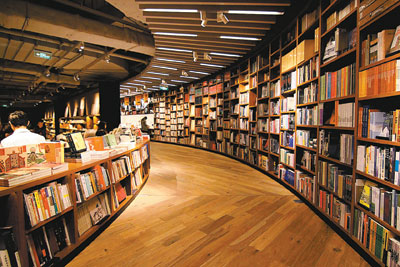
YANDI MBEKI (pseudonym), the 39-year-old wife of a diplomat from South Africa, Googled “English bookshops in Beijing” on her arrival in the city, but found no really helpful guides. For the first five months of her stay, she went to a small community bookshop near her home and resorted to amazon.cn to find textbooks in English.
Fortunately, her husband then noticed Page One, a Singaporean bookstore chain that has three branches in Beijing. Yandi, a bookworm who spends about two hours every day reading, said she was thrilled to find a store that offers “two floors” of books.
Booksellers in the country’s major expatriate habitats, such as Beijing, Shanghai and Guangzhou, have responded to these visitors’ desire for books in their own languages, and opened bookstores designed to appeal to foreign customers, according to China Daily.
Chen Weiye, the founder and manager of Garden Books, a bookshop famous among expatriates in Shanghai, quit his job at a State-owned book company 10 years ago to establish his foreign-language bookstore, determined to make it a landmark that fits the international city of Shanghai.
“Back then few expatriates spoke Chinese, and the Internet was not yet so accessible. I wanted to be a provider of cultural life,” he said.
Garden Books is more like a community center than just a bookshop, where people meet with friends and listen to lectures by visiting overseas authors in a sophisticated, relaxing environment.
The two-story building built in the 1930s sits on a quiet street lined with plane trees in downtown Shanghai’s former French Concession. It was refurbished by expatriate architects and interior designers and completed with imported furniture from Europe. The refurbishment cost more than 2 million yuan (US$320,800).
A flea market the bookshop used to hold at weekends attracted thousands of people, filling the 400-sqm space.
“We had to cancel it because security maintenance became a tricky problem,” Chen told China Daily.
Foreign readers in China look for not only books but also a variety of events and a similar way of doing business to bookstores in their home countries.
Lisa Roberts, a visiting visual artist from Australia, decided to check out The Bookworm Beijing as “word-of-mouth” told her it was similar to her favorite bookshop in Sydney, Berkeleouw’s.
She was not disappointed. “I like how they have secondhand books. The books go around and it is good for sustainability, which I’m keen on,” Roberts said.
“I like to browse and be surprised with what I find. I like to be able to sit, have a coffee and read a little.”
The Bookworm, which has locations in Beijing, Suzhou and Chengdu, was set up by a British woman in Beijing in 2005 as a library, with about 2,000 books she bought from book fairs overseas.
The collection has now grown to more than 16,000 titles, most of which are in English, and the store has become a multifunctional hub which incorporates the roles of library, bookstore, bar, restaurant and events space.
The Bookworm’s main attractions are its events. It regularly runs small concerts, seminars and readings, as well as new-to-Beijing orientations.
Its biggest event is the annual Bookworm International Literary Festival, during which 60 to 80 writers from around the world are invited to give lectures at the stores.
“We can’t point out what exactly is the thing that draws customers in. Some book an event, some come for coffee and some are here just to hang out,” said Sunny Zhao, manager of The Bookworm’s shop in Beijing’s Sanlitun area, a hotspot for expatriates.
“Readers can all find something they like in The Bookworm.”
Although brick-and-mortar booksellers in China are expanding their volume of books in foreign languages, some expatriates still have difficulty finding what they want on the shelves.
Non-English speakers can find only a few books in their mother tongues for sale, and they are expensive.
Michela Pacco, an Italian woman who has lived for a year in Guangzhou as an art institute PR person, relies on bringing books from Italy or asking her sister to ship the books she wants. Fangsuo Commune in the city, where a number of books in English are available, can’t satisfy her need for books.
Yvan Schulz, a Swiss researcher who has been working in China on and off for three years on the subject of e-waste, seldom buys books in Guangzhou, where he and his wife live. He resorts to buying e-books online and bringing books from Switzerland.
“Most of the English books sold here in China are best-selling fiction, but I need professional books,” Schulz said.
Being comfortable using Chinese, he tried to buy books on taobao.com, but was unable to as the popular shopping website requires customers to provide Chinese ID card numbers when they order and pay.
Schulz’s wife, Cristina, has little Chinese and has been looking for a bookstore in the southern Chinese city where she can buy books in foreign languages and enrich her social life.
Cityweekend.com.cn, echinacities.com and gzstuff.com are some of the English websites that expatriates in Guangzhou browse most often in search for leisure activities. However, Cristina has found little to interest her on these sites.
“The information is mostly about going to bars, clubbing and partying. But I’m not a partygoer,” she said. “A bookstore is important in my cultural life. I like reading and I hope to meet other foreigners with interests that relate to me at events the bookstore hosts.”
“It would be great if anyone could make a guidebook to point me the way to bookstores suitable for foreigners,” she adds.(SD-Agencies)
|

